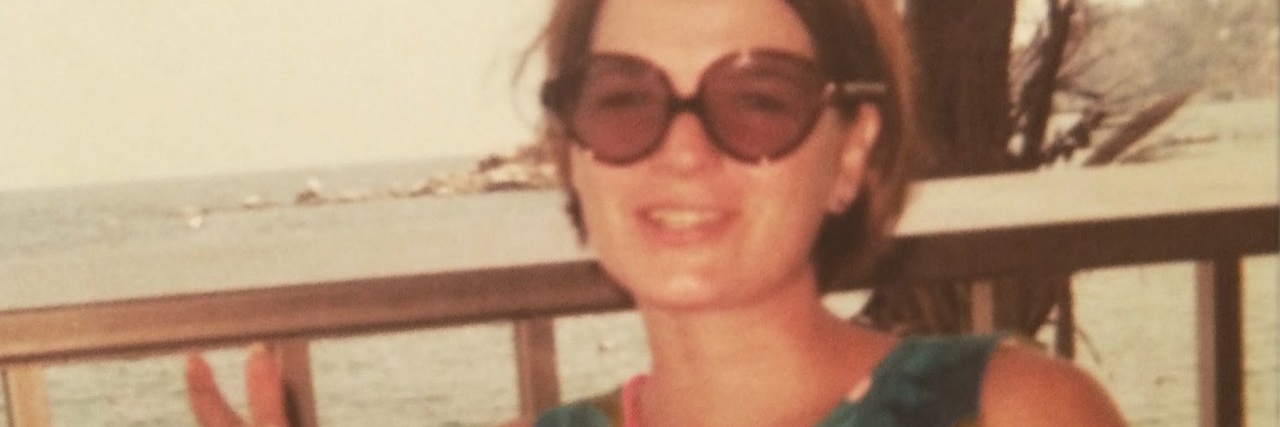What My Mom’s Old Photos Mean to Me After She Passed Away From Cancer
I’ve been snooping around my parents’ house, looking for old photos. My dad loves photography, and I know we have boxes of pictures around here somewhere.
There are few pictures of my parents that don’t include a younger version of me. I want to find these photos because I want to have as many visual reminders of who my mom was, physically, before the cancer came.
I want to remember her smiling, vibrant and sometimes clearly annoyed with the photographer (my dad.) I want all of these as a constant reminder that my mom is so much more than the emaciated woman, lying mostly unconscious in a hospital bed.
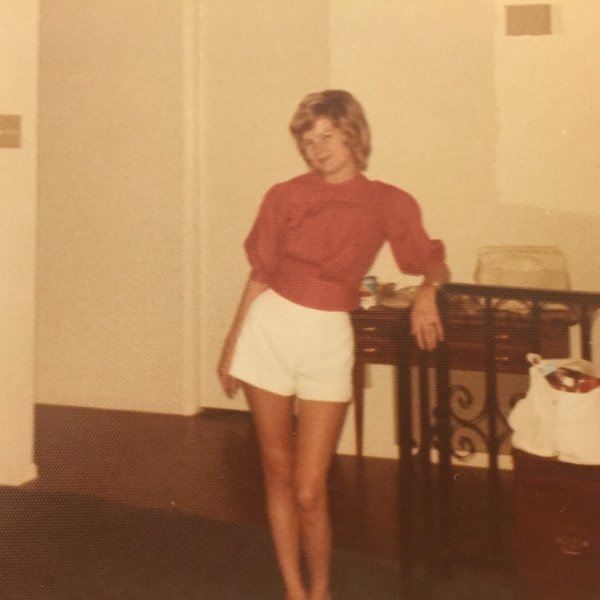
I knew we would be here eventually — Mom in a hospital bed at home. Logically, I understood that fact. We had talked about what she wanted should the chemo not work, but knowing something and actually seeing something are two different things.
I’ve done a number of things in my life that people would consider difficult. I’ve run five half marathons and one full marathon. I’ve fundraised thousands of dollars for charities. I went back to school to finish my bachelor’s as an adult while working full time.
I’m proud of those accomplishments and find value in doing things that are hard. However, watching cancer take my mother has been the hardest thing I’ve ever done in my life, and I would never want to repeat it.
I used to picture death at home as something soft, and well lit, like Beth in “Little Women” or being on the “Oprah” show, where everyone looks good. I pictured something quiet, solemn and meaningful with long conversations about shared memories and wisdom.
I’m not sure why I thought this. I’d seen my mom close enough to death in the ICU twice — it wasn’t soft, and she didn’t look good. Death at home is a hospital bed and the hum and sigh of an oxygen machine. It’s fights over eye drops and clamped mouths to avoid medications and oral hygiene. It’s bedsores that have turned into massive open wounds. It is sunken skin and lost hair. It’s changing diapers and suctioning secretions from your mother’s trach tube. It is not romantic or heartwarming.
I was not really prepared. I don’t know how to really describe what it’s like to watch my mom, the strongest woman I’ve ever known, melt away to skin and bones in a hospital bed.
In early March 2014, my mother was diagnosed with stage IV squamous cell carcinoma of the soft palate. The recommendation was an invasive surgery where doctors would take out the entire tumor, along with the lymph nodes nearby, and then radiation.
The surgery happened on April 1, and while the recovery took several weeks longer than expected due to pneumonia in the hospital, my mom was ready to move on to radiation at the end of June. The doctors were confident, so she had her scans done and met with a radiation oncologist, who was not as pleased with the results of the surgery. Either the surgeons weren’t able to get the entire tumor, and/or more had grown and spread. This should have been our first big red flag that this beast wasn’t going to play by our idea of the rules.
So, instead of starting radiation, we prepared for a second surgery. This time, doctors also removed several inches of her jaw and grafted bone from her shin to reconstruct it. We were in for several more weeks of hospital recovery before it was finally time to move on to radiation and chemotherapy.
We told my mom you could barely see the scar, which was true, but the incisions, which went from the middle of her bottom lip, down her chin and around under of her jawline to her left ear, created a cleft that hadn’t existed before. My mom joked with family and doctors that she had wanted to lose 15 pounds, and hoped she accomplished this while being fed through a tube.
Both treatments had pretty awful side effects. The usual loss of hair didn’t bother my mom, and I teased her she was lucky she had a good-shaped head. The radiation damaged the hearing in her left ear and kept her from sleeping. The chemo, however, packed the biggest punch and made her sick to the point of hospitalization in September.
My mom’s younger sister had been visiting and convinced my dad to take my mom to the ER on Saturday. She was admitted, and on Sunday, things took a turn. It was bad. I got a 3 a.m. phone call that Monday: “You need to get up here.” My mom had been struggling to breathe, so they moved her to the ICU as a precaution and keep a closer watch.
It was decided she should be intubated and have some assistance from a ventilator, and while she was having the tube put in, she went into cardiac arrest. The doctors were able to get her heart beating again, but in addition to the damage from the cardiac episode, her liver and kidneys began to fail, and she required continuous dialysis. When my dad picked me up at SFO, he tried to prepare me. He said the doctors had warned him that if my mom didn’t regain consciousness within the day, it was unlikely she ever would.
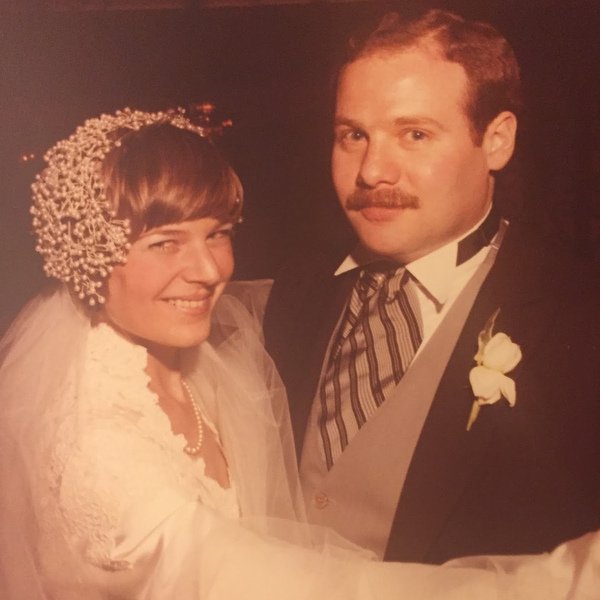
By the time we reached my mom’s ICU room, she was sitting up and awake. In fact, the first thing she wrote (because she was still on a ventilator and couldn’t speak) was, “Why are you here? I don’t want you to get in trouble with work.”
From then on, my mom made a recovery that surprised even the ICU doctors. She was released to a facility outside Marin that could take her and provide dialysis. Within a few weeks, she was off dialysis completely and ready to get back to her radiation treatments. Chemo, however, was on hold indefinitely.
In early January, we got the results from the scans. There was good news and bad news. The good news was the radiation had worked, and there was no sign of cancer in her soft palate. The bad news was the cancer had spread. She had a small growth on the bone just above her left eye, and there were now tumors in her lungs.
We went back to radiation for the small growth above the eye and tried half doses of the chemo for the other tumors. By St. Patrick’s Day, she was back in the ICU. On the plus side, the chemo had shrunk some of the tumors and kept the growth of the cancer at bay.
So once she was strong enough, it was back to the half doses of chemo, and again in September, she was back in the ICU. This time was worse. My dad called me mid-day at work and was in tears on the phone. He wouldn’t even leave the hospital to pick me up from the airport, so I took an Uber to UCSF.
My mom had had another cardiac episode, and this time, the ventilator was breathing for her, not just assisting. She was on three medications, which were pumping her heart, while a fourth medication managed her heart rate — all of these medicines were at the highest doses possible. Machines were doing nearly everything for her, and she was heavily sedated. Her face was shrunken; her skin was a grayish color. Frankly, she looked dead or as near it as I had ever seen. I felt almost certain that this was it.
Doctors asked us about her advanced care directive. Did we want them to perform compressions should she go into cardiac arrest again? We said no. They asked if we wanted them to pursue dialysis should her kidneys get worse and fail. Again, we said no. My mom had been very clear; she didn’t want machines keeping her alive if she wasn’t likely to recover. We were told that should she not show signs of recovery within the next day or so, we would need to make a decision about the medications and the ventilator.
My heart was in my throat for days. All four of my mom’s brothers came to see her, and her youngest sister also came. Her older sister had broken her hip and couldn’t come. Everyone seemed resigned to the fact that this was the end.
And yet, somehow, she started to turn around. Her liver function got better, and she was weaned off the various blood pressure and heart rate medications. Her kidneys never got bad enough to require dialysis, and after four and a half weeks, she was moved to a step-down facility in order to get the physical therapy and occupational therapy needed to get her home. She spent a total of four months between two sub-acute facilities before she and my dad were able to drive to Phoenix where they planned to retire near my mom’s family. That was December 2015.
Once in Phoenix, my parents bought a house and adopted a second dog, and my mom met with her new medical team at the Mayo Clinic. Because she reacted so poorly to even half doses of chemo, the doctors recommended she try a monoclonal infusion instead. It’s supposed to act like chemo without the same side effects. She went ahead and got through her infusions with the only side effect being fatigue. And in April, she had more scans done to determine the results.
This was the tipping point. Not only had the infusions not done anything to shrink the existing tumors in her lungs, they had grown and spread. The oncologist gave my parents an estimate of six months. My mom agreed to try chemo again, not wanting to give up. This time, she made it through two infusions before landing in the critical care unit with pneumonia in both lungs, bacteria in her bloodstream and an infection in her bowels.
After two days in the hospital and meeting with the doctors and her oncologist, my mom decided to stop treatment and pursue hospice care. She spent about a week at an in-patient facility while doctors assessed her, and the social worker ensured we would have all the equipment necessary at the house to keep her comfortable.
Once I arrived in Phoenix after taking time off of work, reality began to sink in. It had only been a few weeks, but my mom looked awful. She was losing her hair again and had a terrible scrape on her face and arms from when she’d tried to get out of bed in the middle of the night. She had always bruised easily, at least for the last 10 years or so for taking a blood thinner, but the left side of her face was a purple and blue mess.
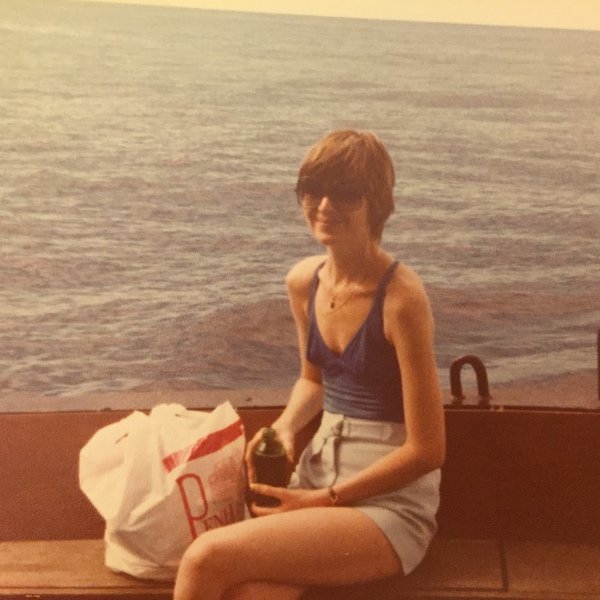
My dad seemed to be keeping himself going just by remaining in nearly constant motion. To give him the chance to run errands, I learned how to use a portable suction machine, pushing a small tube down my mother’s trachea to suck out the thick secretions that she wasn’t strong enough to cough up on her own. I had a refresher course on how to give her meds through a feeding tube that was placed in her abdomen and then directly into her mouth when the only meds left were morphine for pain and Ativan for anxiety and breathing.
I don’t know how to describe how it feels to look into your mother’s eyes — pupils just tiny black dots in a watery sea of blue green that seem to be looking at nothing. When she can’t speak and doesn’t have the strength to write words, and you want nothing more than to tell her how much you love her, but she can only move her lips a little and blink at you, and you’re not sure if she even knows who you are.
You tell her she’s the best mom, the greatest mom, the mom you would choose again and again if you could. You want her to know — really know that she didn’t ruin your life all those times you screamed those words at her and slammed doors.
You want to tell her you would take this from her if you could because it’s all so unfair.
I spent hours berating myself for all the milestones she’ll miss because I didn’t get my act together soon enough. I can’t believe I didn’t insist on getting married while she was healthy, and why couldn’t I have just gotten pregnant? She’d have been such a great grandmother. What the hell was wrong with me that I couldn’t just take a traditional path and graduate from college like everyone else?
In the last few weeks, she cried inconsolably at night because she didn’t want to die, and she didn’t want to leave my dad and me because she was scared. I didn’t even know what to say to this except, “Please don’t leave me,” which was selfish and horrible because I know no one lives forever. I wasn’t prepared for the kind of heartbreak I felt when I realized she was confused, and when I asked if she knew who I was, she just cried.
My mother was never a soft woman physically. Even in my memories as a child, my mom was very thin. As she lay dying, she was more than thin. She’d been turned into nothing but sharp angles and wrist bones.
She didn’t really want anyone to touch her or hold her hand anymore. Everything was uncomfortable, and the daily movement involved with changing her diaper and the dressings on her sores was painful enough to warrant multiple doses of morphine. Just a few days before, she would reach out for our hands, beseeching us to hold her, but in the end, you could tell even her skin must have hurt. One afternoon, after trying to swab her mouth, my dad, defeated, looked at my mother, and said, “I really hate this.”
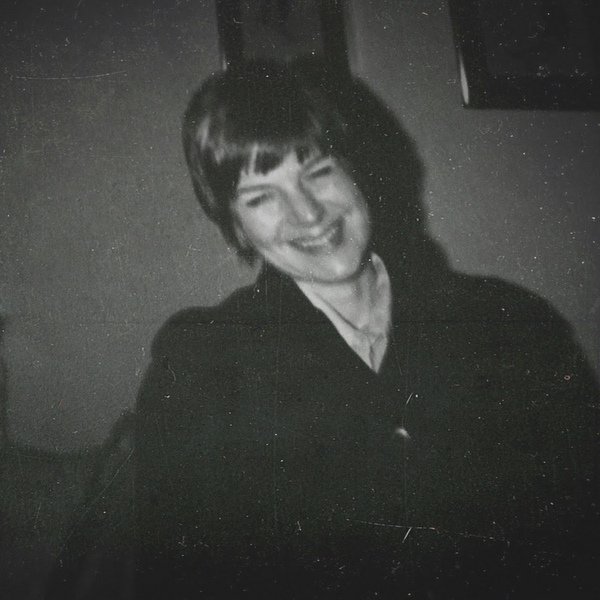
Then one afternoon, my dad and I stood at my mom’s bedside. Her breathing had become very shallow, and we held her hands and were with her when at about 2:30 p.m. she stopped breathing. We knew this would come, and just as she wished, we were there with her.
I am heartbroken, and truthfully, I don’t know how long this hurt will be this raw. But, I am incredibly grateful I was able to spend this time with her and that she is no longer in any pain and doesn’t have to fight so hard.
Because my mom was so sick for so long, I don’t want to remember her as she was when she passed. She wouldn’t have wanted that either, so instead, I carry the photos I found of her from her wedding day, my parents’ honeymoon and the time right after I was born.
I will use them to remind me not just of the images I remember of my mom while I was growing up, but of the young woman who laughed easily and helped others and gave everything she had to life.
A longer version of this post was originally published on Books Beauty Bling.
The Mighty, in partnership with Fuck Cancer, is asking the following: Share a story about one moment or conversation related to a cancer diagnosis or experience that made an impact on you. Find out how to email us a story submission here.

